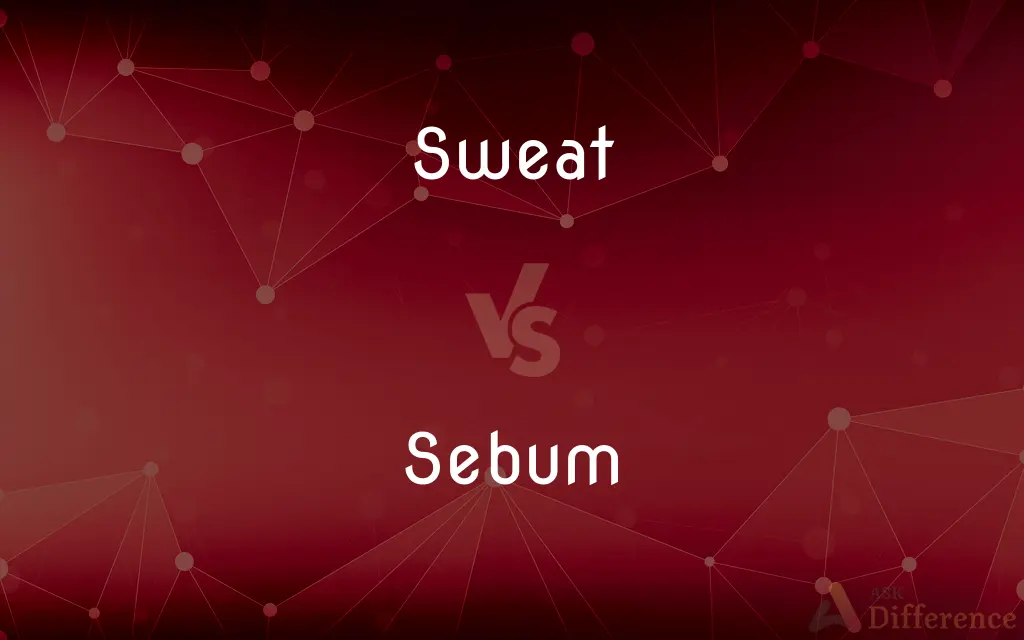Sweat vs. Sebum — What's the Difference?
By Tayyaba Rehman & Maham Liaqat — Published on June 24, 2024
Sweat is a watery fluid excreted by sweat glands to cool the body, whereas sebum is an oily substance produced to lubricate skin and hair.

Difference Between Sweat and Sebum
Table of Contents
ADVERTISEMENT
Key Differences
Sweat is produced by eccrine and apocrine glands, primarily for body temperature regulation through evaporation. Whereas sebum is secreted by sebaceous glands, aiming to moisturize and protect the skin and hair from drying out.
Eccrine sweat glands are distributed over most of the body and produce a watery fluid mainly composed of water and salts. On the other hand, sebaceous glands are closely associated with hair follicles and secrete sebum, which is rich in lipids.
Sweat production is often triggered by heat and physical activity, leading to the cooling effect when the sweat evaporates from the skin surface. Whereas sebum production is more constant but can be influenced by hormonal changes, which sometimes leads to an oily appearance or acne.
While sweat is known for its role in thermoregulation and can also serve as a means of excreting waste products, sebum provides a protective barrier against external factors, including bacteria and fungi, and helps in maintaining the integrity of the skin.
Sweat, being mostly water, evaporates into the air, leaving no significant residue on the skin. However, sebum, being oily, can accumulate on the skin and hair, requiring regular cleansing to prevent pore clogging and skin conditions.
ADVERTISEMENT
Comparison Chart
Primary Function
Cools the body by evaporation
Lubricates and protects skin and hair
Composition
Mostly water and salts
Lipids, triglycerides, and fatty acids
Produced by
Eccrine and apocrine glands
Sebaceous glands
Trigger
Heat, physical activity
Constant, influenced by hormonal changes
Role
Thermoregulation, waste excretion
Moisturizing, protective barrier against bacteria
Compare with Definitions
Sweat
Body cooling mechanism
Sweating increases during physical activity to cool the body.
Sebum
Rich in lipids
Sebum's composition includes various lipids, making it oily.
Sweat
Water and salts composition
The primary components of sweat are water and electrolytes.
Sebum
Protective barrier
Sebum forms a protective barrier on the skin against external threats.
Sweat
Produced by eccrine glands
Eccrine sweat glands are responsible for most body sweating.
Sebum
Produced by sebaceous glands
Sebaceous glands, often associated with hair follicles, secrete sebum.
Sweat
Excretion of waste
Sweat can also help in excreting waste products from the body.
Sebum
Skin and hair lubricant
Sebum helps to keep the skin and hair moisturized.
Sweat
Evaporative cooling effect
The evaporation of sweat from the skin surface produces a cooling effect.
Sebum
Hormonal influence
Hormonal changes can affect the rate of sebum production.
Sweat
To excrete perspiration through the pores in the skin; perspire.
Sebum
The semifluid secretion of the sebaceous glands, consisting chiefly of fat, keratin, and cellular material.
Sweat
To exude in droplets, as moisture from certain cheeses or sap from a tree.
Sebum
(physiology) A thick oily substance, secreted by the sebaceous glands of the skin, that consists of fat, keratin and cellular debris.
Sweat
To excrete (moisture) through a porous surface, such as the skin.
Sebum
The oily secretion of the sebaceous glands; with perspiration it moistens and protects the skin
Sweat
Fluid that exits the body through pores in the skin usually due to physical stress and/or high temperature for the purpose of regulating body temperature and removing certain compounds from the circulation.
Sweat
To cause to excrete moisture from the skin; to cause to perspire; as, his physicians attempted to sweat him by most powerful sudorifics.
Sweat
The fluid which is excreted from the skin of an animal; the fluid secreted by the sudoriferous glands; a transparent, colorless, acid liquid with a peculiar odor, containing some fatty acids and mineral matter; perspiration. See Perspiration.
In the sweat of thy face shalt thou eat bread.
Sweat
Excrete perspiration through the pores in the skin;
Exercise makes one sweat
Common Curiosities
Can sebum production be influenced by external factors?
Yes, sebum production can be influenced by hormonal changes.
What triggers sweat production?
Sweat production is triggered by heat and physical activity.
Can excessive sweating be harmful?
While generally not harmful, excessive sweating can lead to dehydration if fluids are not replenished.
How do sweat glands differ from sebaceous glands?
Sweat glands produce sweat for cooling, while sebaceous glands produce sebum for lubrication.
What could excessive sebum production lead to?
Excessive sebum production can lead to oily skin, acne, and other skin conditions.
What is sweat primarily composed of?
Sweat is primarily composed of water and salts.
What is the main function of sebum?
The main function of sebum is to lubricate and protect the skin and hair.
Why is sweat important for the body?
Sweat is important for regulating body temperature and excreting waste.
How does sebum benefit the skin?
Sebum moisturizes the skin and provides a protective barrier against bacteria and external damage.
What are the differences in composition between sweat and sebum?
Sweat is watery with salts, while sebum is oily with lipids.
Is it possible to stop sweating or sebum production entirely?
Completely stopping sweat or sebum production is not advisable as both serve important bodily functions.
What role do hormones play in sebum production?
Hormones, particularly androgens, significantly influence sebum production rates.
How can one manage sebum production?
Regular cleansing and using products designed for oily skin can help manage sebum production.
Can diet affect sweat and sebum production?
Yes, diet can influence both sweat and sebum production, with certain foods potentially increasing or decreasing production.
Are there ways to control sweat production?
Yes, antiperspirants and lifestyle changes can help control sweat production.
Share Your Discovery

Previous Comparison
RAM vs. Storage
Next Comparison
Agreement vs. Memorandum of UnderstandingAuthor Spotlight
Written by
Tayyaba RehmanTayyaba Rehman is a distinguished writer, currently serving as a primary contributor to askdifference.com. As a researcher in semantics and etymology, Tayyaba's passion for the complexity of languages and their distinctions has found a perfect home on the platform. Tayyaba delves into the intricacies of language, distinguishing between commonly confused words and phrases, thereby providing clarity for readers worldwide.
Co-written by
Maham Liaqat












































